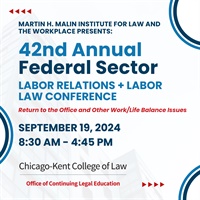Best Practices for Workplace Investigations
- Categories:
- Labor Law | Labor Relations
- Speaker:
- Deborah Hopkins
- Duration:
- 1 Hour
- Format:
- Audio and Video
- Original Program Date:
- Sep 19, 2024
- Product Type:
- On Demand
- License:
- Never Expires.
Description
Allegations of workplace harassment exist in every agency. While some complaints have merit, others are made because of a workplace conflict that may – or may not – have anything to do with a protected EEO category. Practitioners can usually recognize harassment that violates Title VII, but what about conduct that is unrelated to EEO? Actions that are unwelcome, isolating, threatening, intimidating, or disturbing – known as “other harassment” – must still be investigated as potential misconduct. This program will not only identify the lines that separate these differing levels of alleged harassment both perceived and real, but will also explain best practices for investigating various types of harassment claims.
Speaker

Deborah Hopkins Related Seminars and Products
President
Federal Employment Law Training Group
Deborah J. Hopkins is a Federal employment law attorney, and is President of the Federal Employment Law Training Group (FELTG), an SBA-Certified Woman Owned Small Business. In addition to presenting training sessions and developing course materials for dozens of programs, she has worked with clients on cases before the U.S. Merit Systems Protection Board, the Equal Employment Opportunity Commission, and the U.S. Office of Special Counsel. She has also worked with the Government Accountability Project (GAP), a public-interest non-partisan whistleblower protection and advocacy organization. She also works with agencies on policy development.
Ms. Hopkins is the author of UnCivil Servant: Holding Employees Accountable for Performance and Conduct (Dewey Publications, 2024), now in its 6th Edition. She is a member of the District of Columbia Court of Appeals, the American Bar Association, and the Society of Federal Labor and Employee Relations Professionals.


